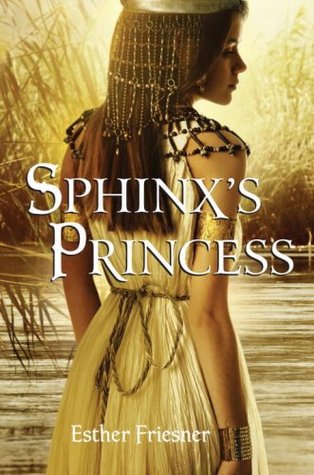 Sphinx’s Princess by Esther M. Friesner
Sphinx’s Princess by Esther M. Friesner
Guess what, guys? We’re delving back into Ancient Egypt once again!
By this point that probably doesn’t come as a surprise…
Sphinx’s Princess is a retelling/origin story of the Egyptian queen Nefertiti, one of the most famous–and mysterious–female figures in Ancient Egyptian history. She is most known for her part in religious heresy with her second husband Akhenaten, but Sphinx’s Princess follows Nefertiti (meaning ‘the beautiful woman has come’) in her life before even her first husband. Nefertiti’s family is conned by her beyotch of an aunt into marrying her to the crown prince Thutmose but make a deal to delay the wedding so the novel focuses on Nefertiti’s trials and tribulations in the palace with the royal family.
The book is about what I’d expected it to be since I wasn’t really expecting much. Friesner was a relatively unknown author to me and the book is older so I kind of figured it wasn’t that much to brag about or I’d have heard of it sooner. Reviews in general are also very mixed which makes it hard to really get a feel for it beforehand. I wanted to like it but I was only expecting ‘alright’ and that’s what Sphinx’s Princess is: just good, okay, alright.
To be honest, I mostly bought it for the history. If you’ve been on my blog at all before you’re probably aware of my love for all things Ancient Egypt which makes Sphinx’s Princess right up my alley. I guess a side effect of studying the history is that I notice inaccuracies and this book has a lot of them. I was annoyed, to say the least–I specifically got the book for the history, since it appeared to focus on the history, and then it gets pieces of the history wrong? Come on! Is it too much to ask to just ONCE have a book that’s enjoyable and entirely historically correct????
Okay, maybe, since I’ve yet to see a movie that could deliver on that. But books are supposed to be better!
Anyway, if you don’t know the intricacies of Ancient Egypt or are not familiar with the real Nefertiti this probably won’t bother you. And even so, there is still a lot about Sphinx’s Princess that is a good representation of Ancient Egypt so despite my annoyance I could mostly enjoy the setting and the story.
Something interesting about this novel’s set-up is that Friesner starts the story in Nefertiti’s childhood and, instead of jumping straight into her adolescence when the primary events take place, the book follows Nefertiti in the years leading up to them. I’ve seen this done once before in The Darkest Minds by Alexandra Bracken but in that case it is done quickly and effectively with a number of time jumps so we get all the necessary early life info without becoming completely uninterested. Uuuuuunfortunately, Sphinx’s Princess doesn’t fully succeed here. No, Sphinx’s Princess spends a good half of the book watching Nefertiti grow up from age 5 all the way to 14 before it even touches on anything from the synopsis. And while there’s nothing wrong with a little backstory, I got bored. Really quickly.
Nefertiti’s character felt a little subpar for me. The real Nefertiti by all accounts was quite the force but while book Nefertiti talks all about being strong and sure and fair, it mostly is just that: talk. There aren’t a lot of opportunities for her to show off these things so the book feels basically like you’re watching everything take place instead of connecting with the characters or riding alongside them. She’s also fairly naive and kinda dull and not at all impressive.
The characterization Friesner chose for her other characters is interesting, albeit unexpected. Some of it I didn’t agree with, some of it I really liked, but all of it was neat to see, especially from a history POV





